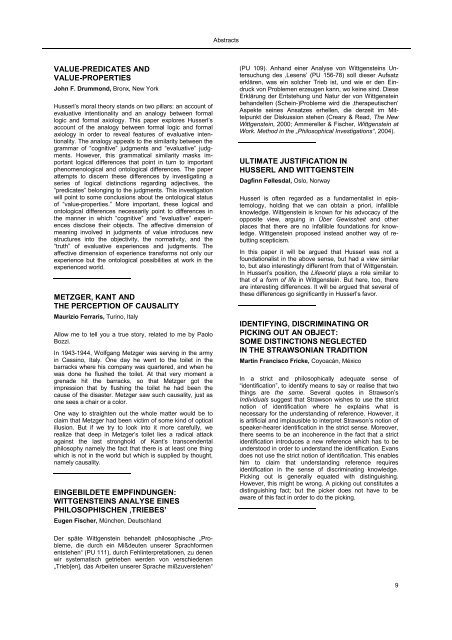Erfahrung und Analyse Experience and Analysis - Austrian Ludwig ...
Erfahrung und Analyse Experience and Analysis - Austrian Ludwig ...
Erfahrung und Analyse Experience and Analysis - Austrian Ludwig ...
Create successful ePaper yourself
Turn your PDF publications into a flip-book with our unique Google optimized e-Paper software.
VALUE-PREDICATES AND<br />
VALUE-PROPERTIES<br />
John F. Drummond, Bronx, New York<br />
Husserl’s moral theory st<strong>and</strong>s on two pillars: an account of<br />
evaluative intentionality <strong>and</strong> an analogy between formal<br />
logic <strong>and</strong> formal axiology. This paper explores Husserl’s<br />
account of the analogy between formal logic <strong>and</strong> formal<br />
axiology in order to reveal features of evaluative intentionality.<br />
The analogy appeals to the similarity between the<br />
grammar of “cognitive” judgments <strong>and</strong> “evaluative” judgments.<br />
However, this grammatical similarity masks important<br />
logical differences that point in turn to important<br />
phenomenological <strong>and</strong> ontological differences. The paper<br />
attempts to discern these differences by investigating a<br />
series of logical distinctions regarding adjectives, the<br />
“predicates” belonging to the judgments. This investigation<br />
will point to some conclusions about the ontological status<br />
of “value-properties.” More important, these logical <strong>and</strong><br />
ontological differences necessarily point to differences in<br />
the manner in which “cognitive” <strong>and</strong> “evaluative” experiences<br />
disclose their objects. The affective dimension of<br />
meaning involved in judgments of value introduces new<br />
structures into the objectivity, the normativity, <strong>and</strong> the<br />
“truth” of evaluative experiences <strong>and</strong> judgments. The<br />
affective dimension of experience transforms not only our<br />
experience but the ontological possibilities at work in the<br />
experienced world.<br />
METZGER, KANT AND<br />
THE PERCEPTION OF CAUSALITY<br />
Maurizio Ferraris, Turino, Italy<br />
Allow me to tell you a true story, related to me by Paolo<br />
Bozzi.<br />
In 1943-1944, Wolfgang Metzger was serving in the army<br />
in Cassino, Italy. One day he went to the toilet in the<br />
barracks where his company was quartered, <strong>and</strong> when he<br />
was done he flushed the toilet. At that very moment a<br />
grenade hit the barracks, so that Metzger got the<br />
impression that by flushing the toilet he had been the<br />
cause of the disaster. Metzger saw such causality, just as<br />
one sees a chair or a color.<br />
One way to straighten out the whole matter would be to<br />
claim that Metzger had been victim of some kind of optical<br />
illusion. But if we try to look into it more carefully, we<br />
realize that deep in Metzger’s toilet lies a radical attack<br />
against the last stronghold of Kant’s transcendental<br />
philosophy namely the fact that there is at least one thing<br />
which is not in the world but which is supplied by thought,<br />
namely causality.<br />
EINGEBILDETE EMPFINDUNGEN:<br />
WITTGENSTEINS ANALYSE EINES<br />
PHILOSOPHISCHEN ‚TRIEBES’<br />
Eugen Fischer, München, Deutschl<strong>and</strong><br />
Der späte Wittgenstein beh<strong>and</strong>elt philosophische „Probleme,<br />
die durch ein Mißdeuten unserer Sprachformen<br />
entstehen“ (PU 111), durch Fehlinterpretationen, zu denen<br />
wir systematisch getrieben werden von verschiedenen<br />
„Trieb[en], das Arbeiten unserer Sprache mißzuverstehen“<br />
Abstracts<br />
(PU 109). Anh<strong>and</strong> einer <strong>Analyse</strong> von Wittgensteins Untersuchung<br />
des ‚Lesens’ (PU 156-78) soll dieser Aufsatz<br />
erklären, was ein solcher Trieb ist, <strong>und</strong> wie er den Eindruck<br />
von Problemen erzeugen kann, wo keine sind. Diese<br />
Erklärung der Entstehung <strong>und</strong> Natur der von Wittgenstein<br />
beh<strong>and</strong>elten (Schein-)Probleme wird die ‚therapeutischen’<br />
Aspekte seines Ansatzes erhellen, die derzeit im Mittelpunkt<br />
der Diskussion stehen (Creary & Read, The New<br />
Wittgenstein, 2000; Ammereller & Fischer, Wittgenstein at<br />
Work. Method in the „Philosophical Investigations“, 2004).<br />
ULTIMATE JUSTIFICATION IN<br />
HUSSERL AND WITTGENSTEIN<br />
Dagfinn Føllesdal, Oslo, Norway<br />
Husserl is often regarded as a f<strong>und</strong>amentalist in epistemology,<br />
holding that we can obtain a priori, infallible<br />
knowledge. Wittgenstein is known for his advocacy of the<br />
opposite view, arguing in Über Gewissheit <strong>and</strong> other<br />
places that there are no infallible fo<strong>und</strong>ations for knowledge.<br />
Wittgenstein proposed instead another way of rebutting<br />
scepticism.<br />
In this paper it will be argued that Husserl was not a<br />
fo<strong>und</strong>ationalist in the above sense, but had a view similar<br />
to, but also interestingly different from that of Wittgenstein.<br />
In Husserl’s position, the Lifeworld plays a role similar to<br />
that of a form of life in Wittgenstein. But here, too, there<br />
are interesting differences. It will be argued that several of<br />
these differences go significantly in Husserl’s favor.<br />
IDENTIFYING, DISCRIMINATING OR<br />
PICKING OUT AN OBJECT:<br />
SOME DISTINCTIONS NEGLECTED<br />
IN THE STRAWSONIAN TRADITION<br />
Martin Francisco Fricke, Coyoacán, México<br />
In a strict <strong>and</strong> philosophically adequate sense of<br />
“identification”, to identify means to say or realise that two<br />
things are the same. Several quotes in Strawson’s<br />
Individuals suggest that Strawson wishes to use the strict<br />
notion of identification where he explains what is<br />
necessary for the <strong>und</strong>erst<strong>and</strong>ing of reference. However, it<br />
is artificial <strong>and</strong> implausible to interpret Strawson’s notion of<br />
speaker-hearer identification in the strict sense. Moreover,<br />
there seems to be an incoherence in the fact that a strict<br />
identification introduces a new reference which has to be<br />
<strong>und</strong>erstood in order to <strong>und</strong>erst<strong>and</strong> the identification. Evans<br />
does not use the strict notion of identification. This enables<br />
him to claim that <strong>und</strong>erst<strong>and</strong>ing reference requires<br />
identification in the sense of discriminating knowledge.<br />
Picking out is generally equated with distinguishing.<br />
However, this might be wrong. A picking out constitutes a<br />
distinguishing fact; but the picker does not have to be<br />
aware of this fact in order to do the picking.<br />
9












